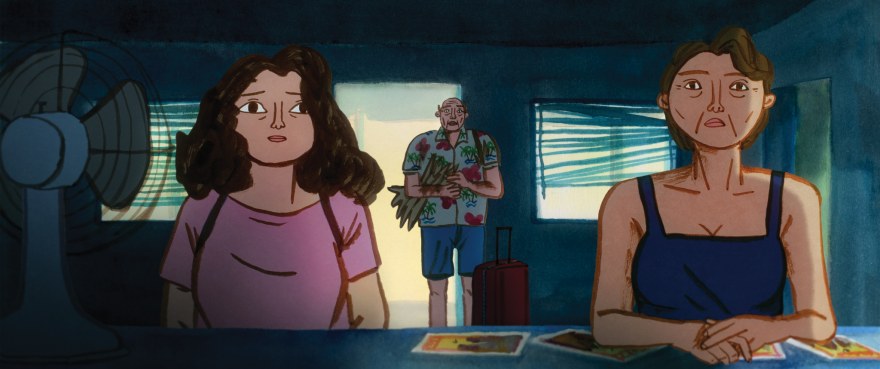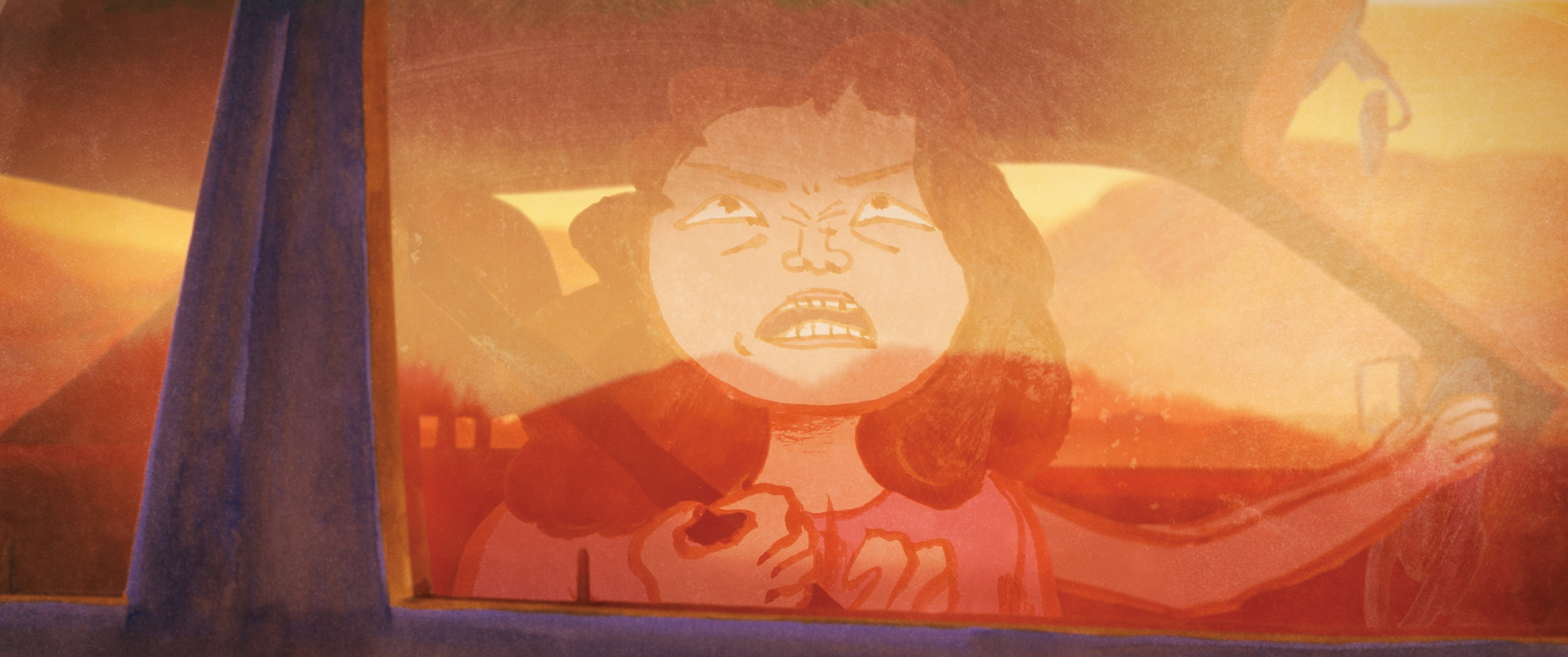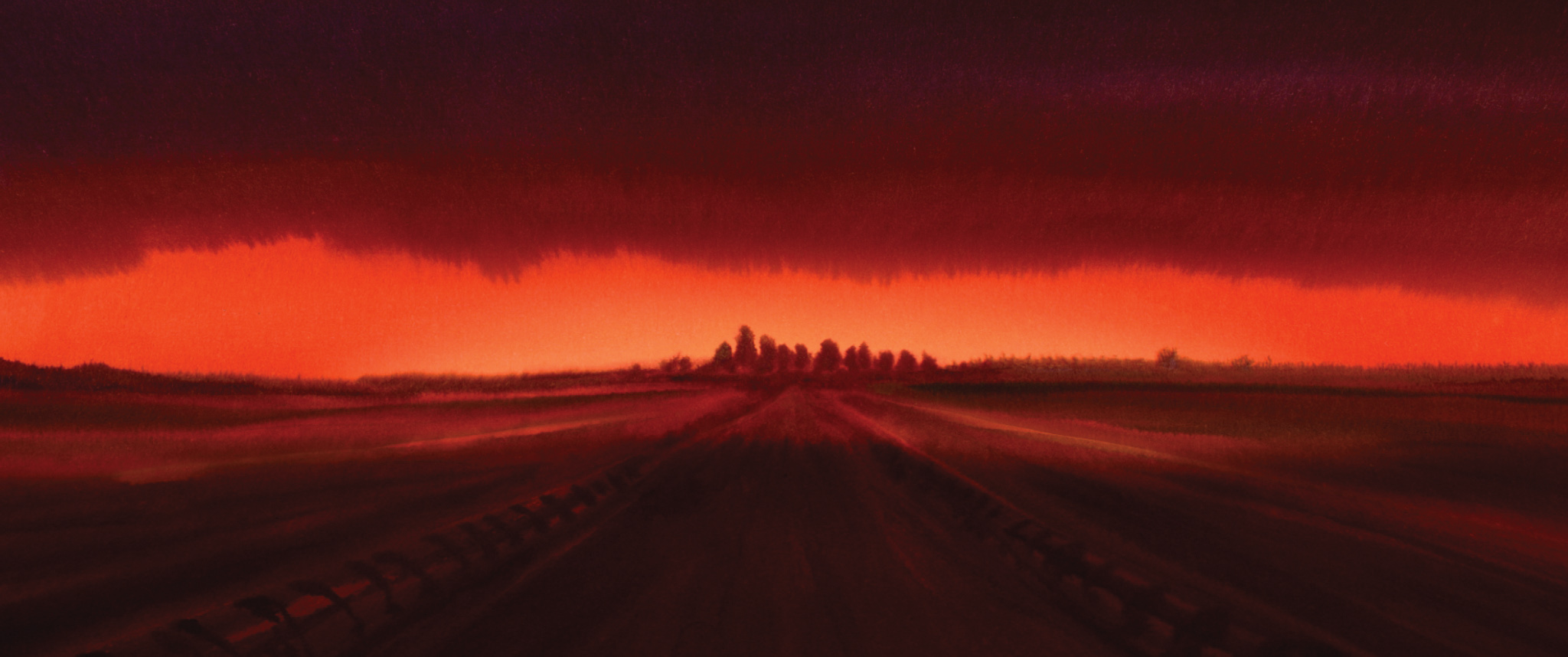Dîner avec Trona Pinnacles
Entretien avec Mathilde Parquet, réalisatrice de Trona Pinnacles
Quelle a été la genèse de Trona Pinnacles ?
L’idée de ce film m’est venue en repensant à un voyage que j’ai effectué avec ma famille aux États-Unis, il y a maintenant plus de 10 ans. Quand j’ai repensé à ce voyage dans le désert californien, deux sentiments bien différents se sont opposés : à la fois le souvenir d’un paysage grandiose, magique, qui possède une force incroyable et appelle un sentiment de liberté ; et de l’autre, le souvenir de solitude, d’insignifiance et d’impuissance dans ce désert qui me semblait immuable. Ces sentiments plus négatifs étaient très certainement liés à la période difficile que traversait ma famille, puisque mes parents ne s’adressaient quasiment plus la parole. Non seulement notre regard peut totalement changer sur un lieu selon ce que l’on traverse mais le lieu aussi peut nous atteindre et ainsi changer notre regard sur notre situation. C’est ce que raconte Trona Pinnacles.
Qu’aviez-vous envie d’explorer à travers le portrait de cette famille au bord sinon de l’explosion, du moins, de la crise de nerfs ?
J’ai eu envie de parler de ce moment de rupture qu’on connut beaucoup de famille. Ou chacun essaie péniblement d’avancer dans un schéma familial qui n’est plus viable. Mais accepter que les choses aient une fin, qu’il faut changer, n’est pas chose facile. Dans ce film, à force de se voiler la face ou de fuir les problèmes, les personnages ne font que s’isoler et s’éloigner les uns des autres, puisqu’ils sont focalisés sur la gestion de leur propre tension. La mise en scène de leur sentiment d’enfermement, dans un désert immense, m’a beaucoup intéressé. Les personnages ne sont donc jamais en contact direct avec le désert. Ils sont successivement contenus dans une voiture, un motel, une voiture… jusqu’à ce qu’un événement inattendu les sortent de cet engrenage. Il faut parfois l’intervention d’un élément extérieur pour permettre le début d’un dialogue.
Selon vous, qu’est venue chercher cette famille à travers ce voyage ?
Changer d’air ! Ils pensaient peut-être qu’en partant loin de leur vie quotidienne, leurs problèmes s’en iraient. Que ce voyage confiné dans cette voiture les rapprocherait. Peut-être ont-ils pensé qu’être ensemble sans possibilité de fuir réglerait leurs problèmes. Peut-être même qu’au fond, cette famille savait que ce voyage serait leur dernier tous ensemble.
Pouvez-vous nous dire quelques mots sur votre technique d’animation ?
Pour raconter cette histoire, j’ai choisi la technique de l’animation 2D traditionnelle sur papier. Les décors ont été peints à l’encre ainsi que le trait des personnages. J’ai choisi cette technique pour l’expressivité du dessin, sa spontanéité et ses imperfections qui me semblait adéquate pour parler de cette famille au bord de la crise de nerf. Le dessin du trait des personnages, ainsi que la façon de les animer, changent selon les situations, pour laisser transparaître leurs émotions. L’animation me permet de faire se rencontrer mes références photographiques et picturales pour retransmettre au mieux l’atmosphère particulière de ce voyage.
Quel est l’avenir du format court métrage d’après vous ?
Alors… grosse question ! Malheureusement ma boule de cristal est cassée mais je peux vous dire ce que j’aimerais que l’avenir du court métrage soit. J’aimerais que ce format soit plus popularisé. Qu’il y ait un retour en force de leur projection avant un long. Qu’il y ait davantage de séances de courts métrages dans les cinémas. Que ce format ne reste pas un format connu et regardé seulement par ceux qui les font. J’espère qu’il continuera à y avoir des festivals de courts métrages, comme Clermont-Ferrand, qui participent à cette ouverture. J’espère que ces courts seront de plus en plus vus dans des lieux divers et variés. Je souhaite une longue vie au court métrage !
Demain on reconfine, quels plaisirs culturels conseillez-vous pour échapper à l’ennui ?
La lecture de classique que l’on n’a jamais le temps de lire. Pour ma part c’est Dune de Frank Herbert. 6 tomes ça occupe bien et ça fait réfléchir.
Pour voir Trona Pinnacles, rendez-vous aux séances de la compétition nationale F8.










